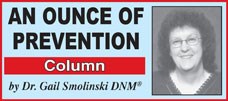At birth, the human brain contains many billions of nerve cells, called neurons. It was previously thought that neurons could not reproduce themselves, so neurons that died from normal wear and tear or injury were not replaced. However, exciting new research shows that it is possible for brain cells to be reproduced, just like cells in other parts of the body.
However, Alzheimer's Disease (AD) is a slowly progressive disorder that destroys neurons and communication pathways of the brain. AD usually strikes people over 65 years old. It occurs more often in females than in males. It gradually causes memory loss and the inability to perform daily activities.
POSSIBLE CAUSES
The causes of AD have not been completely determined. In some cases, genetic factors are present. There may be a weak gene on Chromosome 21.
Various inflammatory processes may contribute to Alzheimer's disease. Another possible cause is previous head trauma.
The abnormal metabolism of magnesium may also be present. Magnesium competes with aluminum for absorption. Environmental toxicity from aluminum and/or mercury exposure has been associated with AD.
Nutritional deficiencies are often involved, since adequate nutrients are needed to produce neurotransmitters. Essential fatty acids serve hundreds of functions. They are indispensable to the brain, which is made up largely of fatty matter.
Cardiovascular risk factors, including high cholesterol, high blood pressure, diabetes and smoking, are associated with a higher risk of developing AD. Arteriosclerosis is linked to decreased blood flow to the brain tissues.
Lately, AD has been called "diabetes of the brain". It is now recognized that processed sugar is toxic to the brain.
Free radical damage is thought to play a part in this, as well as other chronic degenerative diseases. Thus, low levels of antioxidants may contribute to the development of AD.
HEALTHY NUTRITION
Most components of a Mediterranean diet, including an abundance of fruit and vegetables, along with whole wheat and other whole grains, olive oil and fish, may all individually or together reduce the risk and severity of Alzheimer's disease.
Lecithin, found in egg yolks, soy, cauliflower, cabbage and fish, is a building block for neurotransmitters.
Curcumin in curry has shown some effectiveness in preventing brain damage in studies with mice.
Avoid processed sugar to correct the glucose intolerance in the body. A diet rich in antioxidants is an absolute must. A high intake of sulfur-containing foods is good for detoxification. Cabbage, broccoli and other members of the cruciferous family increase antioxidant defense mechanisms and improve the body's detoxification.
HOLISTIC APPROACH
Mild liver detoxification will very likely be beneficial. Identify food allergies and avoid all offending foods. Obtain an assessment of your digestion and immune system functions. Take appropriate measures to improve these, if necessary. Avoid additional toxic and environmental exposures!
Intellectual activities such as playing chess, completing crossword puzzles and regular social interaction, may also delay the onset or reduce the severity of Alzheimer's disease. Bilingualism is also related to a later onset of AD. Exercise is important for your brain as well as for your body!
SMART SUPPLEMENTS
Here are some general guidelines to consider. Digestive enzymes can support the effective breakdown of food into much-needed nutrients. This is important anytime, but especially when we have health challenges.
A Vitamin B Complex is important. Vitamin B12, along with folic acid, is vital for the proper functioning of the nerves. Vitamin B1, also known as thiamin, seems to effectively improve acetylcholine function.
A good antioxidant formula, along with Vitamin C, zinc and flax seed oil are excellent additions to this supplementation program.
Gingko biloba increases circulation to the brain. Ginseng helps to improve memory.
Specifically, any nutritional imbalances of deficiencies or excesses should be identified and corrected. Sustained nutritional support for your body is also important. The development of a personal supplementation program should always be tailored to your individual needs.
Dr. Gail Smolinski, Doctor of Natural Medicine, has her Doctor of Naturopathy degree and is Board Certified in both Traditional Naturopathy and Nutritional Wellness.
She is a Certified Low Intensity Laser Therapist, Master Herbalist, Registered Nutritional Consultant, Professional Homeopath and Holistic Iridologist.
Dr. Gail offers Low Intensity Laser Therapy, individual health consultations, bio-energetic therapies, detoxification footbaths and a wide variety of professional health products at her natural health clinic. You may contact her at 306-783-1261.
This column is not intended to diagnose, treat or cure any disease. It provides general information about health and nutrition. It is run bi-weekly, space permitting.




